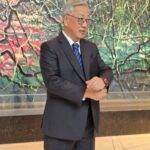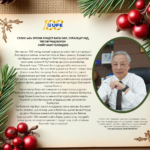Beautiful Plants For Your Interior
Speaking notes for Asia Regional Civil Society Experience Summit
Энэ сарын 8-10 нд Индонезийн Жакарта хотноо зохион байгуулагдаж буй “Asia Regional Civil Society Experience Summit”-д УИХ-ын гишүүн Р.Амаржаргалын хэлэх үг
SPEAKING NOTES FOR ASIA REGIONAL CIVIL SOCIETY EXPERIENCE SUMMIT
(Jakarta, 8-10 September 2014)
At the outset, I wish to thank the USAID, the UNDP, the Asia Foundation and all of you for inviting me to this interesting meeting.
I also salute the distinguished representatives of civil society from our Asia-Pacific region. You are the genuine advocates for democracy, human rights and social progress in your countries.
I’ve been asked to share with you the experience and lessons of Mongolia in developing the civil society sector and my views on challenges and opportunities facing the civil society in the region.
Experience of Mongolia
As you may know, some 25 years ago Mongolia was a totalitarian regime. Our transition to a democracy began only in 1990. During the last years, the civil society organizations in Mongolia have grown from a handful numbers to several thousands.
The civil society in Mongolia enjoys generally broad freedom and favorable environment. However, recently the government has become very slow and reluctant to update and upgrade its policies to match the increasing sophistication and advancement of the professionalism of the civil society.
In my view, the CSOs in Mongolia can be divided into two major categories.
First, those who work in the areas where the government cannot reach out or is weak. This category of CSOs seems to have some sort of comforts with the government. Even the government is willing to delegate to the CSOs some of its social services.
Second, there are many CSOs who operate to influence and to take part in the decision-making at all levels of government. Organizations in this category usually have some confrontation with the authorities and face certain discrimination and ignorance on the part of the government.
Another challenge for the Mongolian CSOs is their lack of experience in mobilizing funding from within the country. While many rely on external financing, the domestic resource mobilization is highly inadequate. Therefore, when there is no external funding, those NGOs cease to operate. Sustainability is a great challenge in Mongolia.
I think we will learn a great deal from the Session on Institutional Sustainability in this respect.
The CSOs in Mongolia are currently undergoing a substantial reform process. If they were mushrooming chaotically in the past, now they have understood that they need to work on consolidation and cooperation in their respective fields. The CSOs are successful where they have established their networking and an umbrella organization.
Individualistic approach and competition for funding among similar CSOs are being replaced by collective approach and network-based consolidation.
The Mongolian civil society is poorly represented in rural areas. Many look at CSOs as employment opportunities rather than working for the betterment of the society. Therefore, the capital city where all government agencies and large corporations headquarter is home to a large majority of the CSOs. That is to be changed.
Philanthropy among the private sector is not well developed. This needs to be tackled too.
Regional and International Dimensions
As you may know also, Mongolia chaired the Community of Democracies (CD) for 2011-2013. It was a successful chairmanship. We laid down the foundation for the establishment of the Asian civil society umbrella organization uniting all CSOs working in the field of democracy and human rights. It is the Asia Democracy Network (ADN) launched in Seoul in 2013 by 50 civil society groups representing 20 countries in Asia. It is a very new organization that needs to be nurtured and supported by all means and by all stakeholders.
Mongolia also helped launch the Asia Democracy Research Network in Seoul last November which is another regional umbrella body of think tanks on democracy-related issues. The network has at present 13 academic institutions as members.
Internationally, Mongolia participates actively in the work of the Working Group on Enabling and Protecting Civil Society of the Community of Democracies. We closely cooperate with the CD’s civil society arm – International Steering Committee.
Mongolia has just assumed the Chairmanship of the Freedom Online Coalition which is an intergovernmental coalition committed to advancing internet freedom – free expression, association, assembly, and privacy online – worldwide.
In this capacity, we are planning to work actively in Asia to expand our ranks. So far only 3 governments in Asia – Japan, the Maldives and Mongolia – have joined the Coalition. I would ask the Asian civil society activists to call on their governments to uphold Internet Freedom which is declared by the United Nations as a fundamental human right and to join the Coalition.
Some thoughts
Finally, I wish to share with you some of my thoughts that are provoked by the lessons in Mongolia.
- It is essential that the CSOs have stable financial sources. Governments should commit a certain percentage of their annual budget to fund activities of CSOs that would be substituting the governmental functions. Delegating some of the public services to CSOs would play a crucial role.
- CSOs need to establish partnership with private sector where possible to help make them transparent, socially responsible and philanthropic.
- In terms of organization, it is a must that similar CSOs become united, networked and appoint an umbrella body. It will help use efficiently the scarce resources and negotiate with the government with one united front.
- Besides a few professional civil society activists, the CSOs need to mobilize public support and volunteering from among the citizens to expand the grass-root base.
- CSOs must use social media and Internet intensively to present their voices and to campaign for and to support their cause.
Thank you.



yavsan summituudiinhaa soninoos, harsan uzseneesee, tursun uzel bodloosoo huvaaltshaarai 🙂
Irgen,